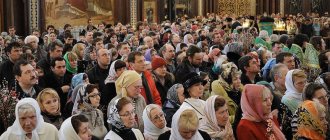How to be baptized correctly - history
Basil the Great called the sign of the cross one of those apostolic Traditions that came to us not through Scripture, but through custom. Everywhere where the apostles preached the Word of God, people who converted to Christianity began to depict the sign of the cross on themselves. People were baptized differently in all countries. In the West - with the whole palm, in Africa it was customary to cross with one finger, index or thumb, as a sign of faith in one God. They could also be baptized in an unusual way - not with a complete cross, but only with the forehead, lips and heart. According to Orthodox tradition, the sign of the cross is used to bless the lesser from the greater: the laity from the priest and the children from their parents.
There is no answer to the question why Catholics cross from left to right, and Orthodox Christians from right to left. Due to long distances, cultural characteristics and differences, the sign of the cross differs in different countries and denominations. We can say that the beginning of the differences was laid by the church schism that occurred in the 11th century. Not only the features of making the sign of the cross differ, but also the vestments of priests, churches, and some customs. Moreover, all Christian traditions have one common root - faith in Christ. So, despite the difference in worship, the Eucharistic canon in Orthodoxy and Catholicism remains almost identical.
But in Christ’s words about “being born of water and the Spirit” there is no direct mention of baptism?
Literally - no, but in fact it is about baptism that it says. After all, it is only in Slavic languages that “baptism” is consonant with the word “cross”, and in Greek (again, the original language of the Gospel) baptism - βάπτισμα - means “immersion in water.” In a conversation with Nicodemus, the Lord Jesus Christ expounds the very meaning of baptism: it is birth from above. When Nicodemus does not understand and asks again: How can a person be born when he is old? Can he really enter his mother’s womb another time and be born? – Christ answers with the words that we have already given: Truly, truly, I say to you, unless one is born of water and the Spirit, he cannot enter the kingdom of God (John 3: 3-7).
Left to right or vice versa? How to be baptized correctly as an Orthodox Christian
First, we place our fingers on our foreheads, asking the Lord to sanctify our mind.
1. We place our fingers on our stomach in the solar plexus area and ask God to prolong the days of our life.
2. Place your fingers on your right shoulder.
3. Place your fingers on your left shoulder.
In this way, we seem to draw a cross on ourselves, agreeing to accept the will of God and follow Christ. To consolidate their devotion to God during services, people also bow to the ground and bow to the ground. When making a bow, people bow at the waist, and during the earthly bow they kneel and touch the floor with their foreheads.
Old Believers, on the contrary, fold their index and middle fingers, and press the rest to the palm. At the same time, the essence of the sign remains the same.
Catholics make the sign of the cross using their entire palm and do it from left to right, not from right to left. The entire palm is used as a symbol of the wounds on the body of Jesus, there were five of them - two on the legs, two on the arms and one from the copy. In Orthodoxy it is believed that this is not a dogmatic, but a ritual image of the cross.
But in order to be born again, you must first die... Isn't it?
Baptism, according to the Apostle Paul, is the experience of death and birth, in the likeness of the death and resurrection of the Lord Jesus Christ.
Do you not know that all of us who were baptized into Christ Jesus were baptized into His death? - he writes in the Epistle to the Romans. - We were buried with Him through baptism into death, so that just as Christ was raised from the dead by the glory of the Father, so we too might walk in newness of life. For if we are united with Him in the likeness of His death, we must also be united in the likeness of His resurrection... If we died with Christ, we believe that we will also live with Him (Rom. 6: 3-5, 8). Of course, in the baptismal font a person does not die and is not resurrected physically - we are not talking about biological death or physical resuscitation. But we are not talking about any conventional, symbolic things or artistic metaphors. Everything that happens in the sacrament happens in reality, but concerns primarily the spiritual side of the personality. A person emerges from the baptismal waters spiritually reborn: he is ready to begin his spiritual life path anew, something like a spiritual “reset” occurs. In any sacrament - and in baptism the first of them - a person encounters the action of God, which Christians call grace, a good gift. In baptism, this gracious action of God consists in the fact that a person is freed from slavery to sinful inclinations, from “bad heredity” received from Adam. Now he is able to resist sinful habits and desires, because from now on he has a new relationship - no longer with the old Adam, but with the new one, with the God-man Jesus Christ. A baptized person becomes a member of the Church - the community of believers in Christ, which the Apostle Paul calls the body of Christ. In this way, he is united with Christ - the Son of Man, and since Christ is at the same time the Son of God, then the baptized person is adopted by God the Father and becomes able to live one life with Him - that same eternal and joyful life of the Kingdom of Heaven. From now on, he is no longer just a creation of God, but His own son or daughter - and therefore everything that the Father has belongs to both him and her.
The Apostle Paul writes about it this way: Consider yourselves dead to sin, but alive to God in Christ Jesus our Lord (Rom 6:11). In the words of the Apostle Paul, the old man dies. And a new man is born, endowed, as Protopresbyter Alexander Schmemann wrote, with the gift of living the life of Christ Himself, believing Him by faith, desiring what He desires. Supported by the gift of grace received in baptism, a person is able to actually move towards the Kingdom of Heaven, which in practice means fulfilling the commandments of Christ: overcoming one’s own selfishness, transcending the demands of one’s “I” and putting God and one’s neighbor first. A baptized person is able to live contrary to the rules that have become “natural” for this world since the Fall. And he may truly want that life - life not for himself, but for God, which Christ offers him and the continuation of which is the Kingdom of God. But an unbaptized person does not have the strength for all this. They simply have nowhere to come from.
How to be baptized correctly in front of the temple and in society?
Orthodox Christians often face the question of whether it is correct to be baptized in public places. There is no single answer to the question of whether it is worth doing this, but it is important to ask yourself the question - why do we get baptized? If a person has an internal need for this or he reads a prayer to himself and wants to cross himself, then, of course, there will be nothing wrong with this. The Lord called us to confession, and Orthodox Christians should not be shy and hide their faith in God. If a person does this for show to show that he leads a pious and righteous life, it is worth asking himself whether something that is designed to help people will harm his soul? Visible evidence of our faith is not condemned if it is for good. By doing a good deed or making the sign of the cross, we demonstrate faith in Christ. But our intentions must also be kind and good. Thinking that someone nearby does not know how to be baptized or is baptized incorrectly, we can do something in condemnation, and not in justification.
Why are Christians convinced that a person cannot be saved unless he is baptized?
Christians are those who believe in the Lord Jesus Christ. And in the statement that an unbaptized person cannot inherit the Kingdom of Heaven, they rely on the words of Christ Himself. First, His instruction to the disciples at the end of the Gospel of Mark: Whoever believes and is baptized will be saved; and whoever does not believe will be condemned (Mark 16:16). Second, in the Gospel of John, Christ explains to His Pharisee follower, Nicodemus: Unless one is born of water and the Spirit, he cannot enter the kingdom of God. That which is born of the flesh is flesh, and that which is born of the Spirit is spirit (John 3:5,6). Third, the Gospel of Matthew ends with the Lord's significant call to the disciples: Go and make disciples of all nations, baptizing them in the name of the Father and of the Son and of the Holy Spirit, teaching them to observe all that I have commanded you (Matt. 28:19, 20). Here, although it does not directly speak about the saving nature of baptism, the order to baptize people sounds like a direct and irrevocable commandment of the Savior.
The meaning of the sign of the cross
Orthodox Christians should not condemn those who do not know how to be baptized correctly, because the grace and love of the Lord do not depend on how we make the sign of the cross (although this should be done in accordance with the fundamentals of the faith). If a person accidentally crosses himself from left to right, but at the same time with his soul he has accepted the way of the cross of Christ and agreed to follow Him, this is not considered a sin. After all, the essence of the sign of the cross is to demonstrate in a visible way what is in a person’s soul - faith and love for Christ.
Read more…
source
Salvation from what is promised to those who believe and are baptized?
Firstly, from slavery to sin, when, in the words of the Apostle Paul, I do not do what I want, but do what I hate (Rom 7:15). Secondly, from slavery to Satan, who through deception and slander against God provoked the fall of Adam and his wife. Thirdly, from death, which subjugated the whole world as a result of the Fall of man. But salvation in Orthodox Christianity is not only called liberation from these three types of slavery. Salvation is the ultimate rapprochement and entry into a filial relationship with God, the achievement of unity with God, the acquisition of that Kingdom of Heaven, where God will be all in all (1 Cor 15:28). Christ himself calls salvation eternal life, about which we can still say little, except that it will be unimaginably beautiful, joyful and, in the words of Metropolitan Anthony of Sourozh, overflowing from excess fullness. As the Apostle Paul wrote about this, eye has not seen, ear has not heard, and what God has prepared for those who love Him has not entered into the heart of man (1 Cor 2:9).
That is, a baptized person becomes a saint?
The conversation about holiness is long and not at all simple. Holiness is a property of God Himself, Who is completely unknowable, therefore what holiness is is not so easy to determine. One thing can be said with confidence: a person who has been baptized is called to holiness, but does not achieve it immediately and not always. Baptism does not deprive a person of free will and does not turn him into an incorporeal angel. He is also subject to various temptations and temptations, and he can also stumble and sin. It’s just that, unlike an unbaptized person, God’s gracious help is available to him to cope with all this. And, even if he stumbles and falls, he will be able to rise, repent and continue on his way.
“Baptized and anointed [with the Holy Spirit in the Sacrament of Confirmation. – Approx. ed.] has within himself, potentially, all the Divine gifts that are revealed in him at one time or another, depending on how much he purifies himself and becomes worthy of the action of the gifts of God in him,” wrote St. Simeon of Thessalonica (late XIV - XV century). So baptism is an absolutely necessary, although not the only condition for saving a person from sin.
But all sins are forgiven in baptism?
Yes, after baptism a person begins life “from scratch”, all his past sins are blotted out and forgotten. But these are sins - specific actions, words or thoughts that violate the commandments of God. The situation is different with passions - “distortions” of the human soul, internal predispositions to bad actions. Outwardly, they may be invisible and may not appear in any way for the time being, but it is they who lead a person to commit specific sins. Perhaps the person has never stolen anything, but he is very partial to money and loves money. And in some critical situation, this passion of his can “shoot out” and lead to the commission of a sin. It's the same with other passions. Passions, unfortunately, remain with a person even after baptism. But with God’s gracious help, he can now fight them and even overcome them little by little. Church sacraments help with this - first of all, Repentance (confession) and Communion of the Holy Mysteries of Christ - His Body and Blood. But the opportunity to resort to these sacraments opens up for a person only after he has accepted the sacrament of Baptism. All sacraments are performed exclusively in the Church, because it is the body of Christ, a space where God can act in harmony with people (and not “above” their will). And we become members of the Church precisely at baptism.
What about an unbaptized person? He will not enter the Kingdom of Heaven under any circumstances?
How I would sometimes like to answer: well, of course, an unbaptized person can also be saved if he believes in God and works on himself! But Christ said very clearly: Unless one is born of water and the Spirit, he cannot enter the Kingdom of God (John 3:5) - and these words are difficult to interpret in any other sense. In the ancient Church, however, there was the idea of “baptism of blood”: martyrs who believed in Christ just before their death and did not have time to receive baptism were not only considered Christians, but were even glorified as saints. Such a “baptism of blood” was received, say, by one of the Roman soldiers who guarded the Sebastian martyrs: seeing the steadfastness and courage of Christians, stripped and driven into an icy lake, he himself believed in Christ, joined their ranks and was glorified as one of them. But the martyrs, even if they did not have time to be baptized, suffered for a reason - they consciously participated in the suffering of Christ, marched to their Golgotha following the example of the Lord. In this life, we all suffer, but not any suffering can be “equated” to baptism, but only that which a person meaningfully “dedicates” to Christ, experiences as his personal participation in His Sacrifice on the Cross. Such suffering is called “suffering for Christ.” But baptism itself is not at all a way to avoid suffering. This is a dedication of your entire life, everything that it is filled with - both joy and sorrow - to Christ. This is communion with His life and His death, voluntary entry into them. If this is not the case, if, while suffering, a person does not strive to put his shoulder under the Cross of Christ, then he suffers in vain, is simply a meaningless victim of evil, in which, after the Fall, the whole world lies (cf. 1 John 5:19). And one cannot even say that the victim was innocent: after all, everyone has something in their soul that really deserves punishment...
Christ and the sinner.
A. Mironov Suffering can sober up a person and bring him to the Church; this happens all the time. But by themselves they cannot replace baptism.











